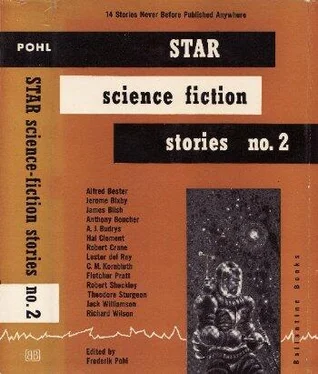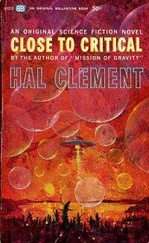Hal Clement - Critical Factor
Здесь есть возможность читать онлайн «Hal Clement - Critical Factor» весь текст электронной книги совершенно бесплатно (целиком полную версию без сокращений). В некоторых случаях можно слушать аудио, скачать через торрент в формате fb2 и присутствует краткое содержание. Год выпуска: 1953, Издательство: Ballantine Books, Жанр: Фантастика и фэнтези, на английском языке. Описание произведения, (предисловие) а так же отзывы посетителей доступны на портале библиотеки ЛибКат.
- Название:Critical Factor
- Автор:
- Издательство:Ballantine Books
- Жанр:
- Год:1953
- ISBN:нет данных
- Рейтинг книги:4 / 5. Голосов: 1
-
Избранное:Добавить в избранное
- Отзывы:
-
Ваша оценка:
- 80
- 1
- 2
- 3
- 4
- 5
Critical Factor: краткое содержание, описание и аннотация
Предлагаем к чтению аннотацию, описание, краткое содержание или предисловие (зависит от того, что написал сам автор книги «Critical Factor»). Если вы не нашли необходимую информацию о книге — напишите в комментариях, мы постараемся отыскать её.
Critical Factor — читать онлайн бесплатно полную книгу (весь текст) целиком
Ниже представлен текст книги, разбитый по страницам. Система сохранения места последней прочитанной страницы, позволяет с удобством читать онлайн бесплатно книгу «Critical Factor», без необходимости каждый раз заново искать на чём Вы остановились. Поставьте закладку, и сможете в любой момент перейти на страницу, на которой закончили чтение.
Интервал:
Закладка:
There would be no point in guessing who was the most surprised by what actually happened, but there was no doubt about which of the observers adjusted himself first. Derrell was paralyzed for just an instant as the first drops of fluid reached the opening of the cavity—and shot straight across it to the other side!— buthe noted carefully and precisely how more of the magma followed. The drops became a stream, and gradually a pool of the stuff came into being against the side of the bubble opposite the opening. The sides of the pool not in contact with the walls of the cavity seemed to want to form a plane surface, but the stream that was adding to its volume gave rise to disturbances which spread from the point of impact in all directions over the surface— waveswhich none of the watchers had ever seen or imagined, and which held even the sentries’ attention to a degree which might have proven disastrous. Not until the bubble had filled completely with molten rock did anyone move, speak, or even think of anything but what was happening a few hundred yards away; and even then most of the team waited for Derrell to express an opinion. He, regarding his assistants as students to be guided by suggestion rather than laymen who might be impressed by spot conclusions, opened his comments with a question.
“Could the ordinary pressure on that liquid account for its behavior?”
“Not completely.” The answer came promptly from one of the team.
“Why not? Pressure can force liquid between rock layers, and even into rock pores; why could it not send a stream across a space where there is no resistance?”
“It could, I suppose; but I fail to see how ordinary rock pressure could keep one side of that growing pool flat when the rock was not actually touching it. That would seem to call for some invisible substance pressing on that particular surface—a substance not only invisible, but able to permit the stream of rock to pass toward the new pool but not away from it. I find such a substance hard to imagine.”
“So do I. Your objection to rock pressure also seems valid—unless someone else can see a way?” He paused for a fair interval, but if any of the assistants had ideas they were not sufficiently formulated for expression. “It would seem, then, that some force with which we are unfamiliar is involved. That means that all the data anyone may have is possibly relevant. Karpor, list the material you have observed which you think might help.”
The student responded at once.
“The igneous rock is largely silicates of magnesium, the stratiform layer next to it mostly calcium carbonate. The bubble is about fifteen feet in diameter, one side almost exactly tangent to the stratiform boundary. The boundary itself is parallel to the Void boundary a mile and a half away. The front edge of the sill was advancing at about six inches an hour, and the sill itself had a thickness of about—”
“All right; good so far. Taless, what else?” Another student took up the list; and the recent arrival forgot his news temporarily in the intensity of the resulting discussion. By the time he remembered it, a hypothesis had been developed.
“It seems possible,” Derrell summed the idea up, “that a force of unknown nature exists, which tends to drive liquids (at least) as far from the Void as they are free to travel. Our single observation is to that effect, anyway. It would seem desirable to find other, more accessible hollows in the deeper rocks, to determine how far from the Void boundary this force extends, and to learn if possible whether other things than liquids are affected.”
“I wonder what the existence of such a force—if it does exist—will do to the Pentong project,” remarked the newcomer, recalling his news suddenly.
“What is that? Another defense plan?”
“Not exactly.” The scientist described Pentong’s discovery of the Antarctic Continent, and his account of its covering of solid ocean. “His plan to melt this substance, and thus protect more of the world’s rock from the oxygen of the Void, has been favorably received by more than half the City Leaders of the continent, and parties are already under way to examine the Southern Continent more completely,” he concluded. A student cut in instantly.
“But if this force exists, and ocean is subject to it as magma is, won’t the freshly melted ocean simply spread flat over what is already there, and perhaps hardly protect any more land at all?”
“That seems probable,” replied Derrell. “Since such a project will involve a vast expenditure of effort, and very possibly interfere with defense on the frontiers, it now becomes imperative that we check the nature and existence of this force as quickly as possible.”
“However, if the available ocean surface is not too large,” put in another, “even spreading the new ocean over all of it might permit a considerable increase in the protected areas.”
“It might; but unless and until we have some idea of the size of the World inside the Void, and how much of the World is covered by ocean, we cannot afford to take a chance on that possibility. We must search for more bubbles; and this carbonate stratum is in contact with igneous rock over many thousands of square miles, it would seem. Break up into parties of three and start exploring; if you encounter savages, call—there are military personnel not too far behind us. This is important.” He turned back to the assistant who had brought the news. “I suppose they plan to do the melting by coaxing magma pools toward the Void boundary, and letting them flow out into contact with this solid ocean.”
“That is the general idea. However, they plan to do it not only on the Southern Continent. It was felt that there might be much of this solid ocean on our own continent, which we had never discovered because we cannot venture near enough to the Void boundary; so every pool we can reach is to be brought into use. The places where light rocks project into the Void probably cannot be reached, but it seems to the planners who investigated the data that all the other regions—more than three quarters of the continent—can easily be coated with melted rock, if it clings to the surface reasonably well.”
Derrell glanced back at the bubble. “It should do that, all right,” he said, “if our force applies out in the Void as well as in the rock next to it. But that means an even more vast expenditure of effort than I had supposed; they’ll be pulling the defenders away from the frontiers until the savages from Asia are fighting the ones from Europe—around our dead bodies. Let’s find those bubbles.” He joined one of the search teams, worried more about the possible waste of work on an inefficient and probably unproductive effort than about the results of covering most of the American continents with lava. After all, he had never heard of the human race, and probably never would.
There was probably not another spot on the North American continent where his team could have found what they sought so quickly; if other regions existed where a lava flow had extended into a shallow sea, hardened, been buried with such speed under calcareous detritus, and then carried down rapidly enough and steadily enough to develop a thick limestone cap over the hardened lava, they had either been lifted back to the surface where they were unapproachable to Derrell’s kind or carried so far down as to be altered completely beyond recognition. Here, however, there were cavities; many of them filled by the limy material that had settled into them and hardened into rock and many just too deep in impenetrable regions of the lava to be attained although they were easily visible, but a fair number both empty and attainable. The water that had once filled them had long since gone into hydrates in the overlying rock, and been replaced by gases from the lava—usually oxides of carbon and sometimes even sulfur. These did not bother the investigators, and it was not long before one of the search teams reported an ideal site for investigation. The group congregated at the spot as quickly as possible, and plans were rapidly made.
Читать дальшеИнтервал:
Закладка:
Похожие книги на «Critical Factor»
Представляем Вашему вниманию похожие книги на «Critical Factor» списком для выбора. Мы отобрали схожую по названию и смыслу литературу в надежде предоставить читателям больше вариантов отыскать новые, интересные, ещё непрочитанные произведения.
Обсуждение, отзывы о книге «Critical Factor» и просто собственные мнения читателей. Оставьте ваши комментарии, напишите, что Вы думаете о произведении, его смысле или главных героях. Укажите что конкретно понравилось, а что нет, и почему Вы так считаете.












